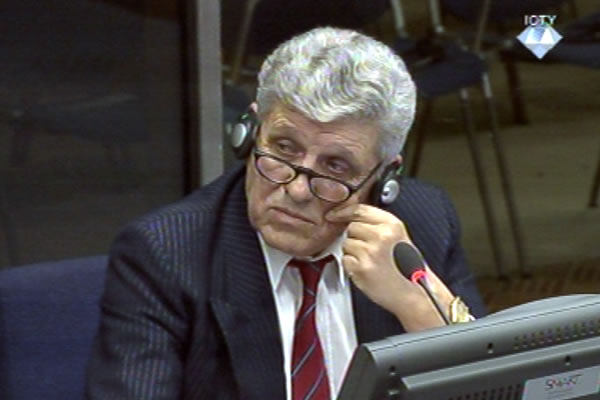Home
PROFITEERING BEFORE MURDER
Although he knew about the crimes against Muslims and Croats in the Omarska and Keraterm prison camps, former president of the Prijedor SDS Simo Miskovic says that as a ‘regular citizen’ he couldn’t demand that the crimes be investigated. The prosecutor then confronted him with a document showing that he had indeed demanded from the municipal authorities to conduct a number of investigations, but only into war profiteering, not crimes against the non-Serb neighbors
 Simo Miskovic, witness at the Radovan Karadzic trial
Simo Miskovic, witness at the Radovan Karadzic trial In his statement to Radovan Karadzic’s defense team, former president of the Prijedor SDS Simo Miskovic tried to whitewash the war-time reality in his municipality. This prompted the prosecutor to remind him that he had painted a different picture in his interviews with the OTP investigators. Then the witness had likewise been careful to protect himself, but had shared much more information with the prosecutors than he did with the defense counsels.
When he spoke to the OTP investigators, the witness said that on one occasion in 1992, he, Stakic, Kovacevic, Brdjanin and Zupljanin, the highest ranking officials in Prijedor and Bosnian Krajina, visited the notorious Omarska prison camp. Miskovic told the prosecutors that he had seen the men behind the wire, looking ‘sick and unwell’. Now, in his evidence in Karadzic’s defense, the witness explained that he wanted to say that he didn’t recognize some of them because they ‘had grown beards’. He confirmed that during his visit he saw several women among the prisoners. He recognized one of them; she was his ‘colleague from work’. He also heard Muslim and Croat detainees signing ‘Serb or Chetnik songs’. He had told the OTP investigators earlier that the prisoners were ‘obviously forced to do so’. Now he hedged, saying he didn’t in fact hear anyone force them to sing.
When he was interviewed by the OTP, the witness said that he heard about the massacre in the ‘Room No. 3’ in the Keraterm prison camp immediately after the incident. About 150 prisoners were killed in the massacre which happened in late July 1992. Now the witness claimed that ‘this is the first time I hear’ about the murder of so many people. However, Miskovic admitted that on his way from Banja Luka he passed by Keraterm and the road was closed ‘because of the tragic event’. Later, a Muslim woman he was involved with told him that a ‘certain number of persons’ had been killed in the prison camp. The woman’s relative was detained in Keraterm.
Despite knowing all that, the witness, who was the top official of the ruling party in the municipality, didn’t do anything to investigate the crimes and to punish the perpetrators, the prosecutor told him. Miskovic replied that he didn’t know in which capacity he ‘as a regular citizen’ could interfere in other people’s affairs, ‘especially those who were armed’.
The prosecution tendered into evidence the documents showing that the witness did use the available mechanisms to deal with those who committed crimes. According to the documents, the witness addressed a letter to the high-ranking municipal and police officials in Prijedor, Milomir Stakic, Milan Kovacevic and Simo Drljaca, in October 1992. Miskovic did not write about the crimes against their Muslim and Croat neighbors but only wanted the authorities to fight ‘war profiteering and abuse of office’. In a bid to explain why he did so, the witness said that the party represented the people, and the people suffered most from the looting of state property. Therefore, his complaint focused on those crimes, the witness said.
The witness resigned from the post of the party chairman in Prijedor in 1993; by that time, most of the crimes against non-Serbs had already been committed. The witness was never indicted for war crimes, primarily because, unlike his party associates Stakic and Kovacevic, he was not an official in the municipal authorities. In his evidence, the witness admitted what most of Karadzic’s witnesses have denied: that Serbs seized power in Prijedor on the basis of pre-war SDS documents, called Variant A and B, and the Six Strategic Goals. The prosecution has alleged as part of its case that there was a plan, or an intent of the Pale leadership headed by Karadzic to carry out ethnic cleansing in the parts of BH Serbs considered as theirs.
In the re-examination, the witness as usual asked a series of leading questions, which are prohibited by the rules. When the presiding judge warned Karadzic that he ‘should not testify but examine’ the witness, Karadzic replied, ‘Oh, I can hardly wait to testify’. The accused will be the last defense witness and is expected to begin his evidence in late February of early March 2014.
After the parties and the judges exchanged best wishes for the New Year, the trial was adjourned. It will continue in January 2014 after the winter recess.
Linked Reports
- Case : Karadzic
- 2013-12-18 PRISONERS IN COWSHEDS
- 2013-12-17 STAKIC: CRIMES AND FORCIBLE EXPULSIONS OF PRIJEDOR INHABITANTS ARE A FACT
- 2013-12-17 TRIAL CHAMBER COMPELLED BEARA TO REPLY TO KARADZIC’S QUESTION
- 2014-01-09 KARADZIC’S PROOF OF ‘HOLBROOKE AGREEMENT’
- 2014-01-16 ‘STRONG’ EVIDENCE THAT SERBS ARE NOT RESPONSIBLE FOR MARKALE 2
- 2014-01-16 ‘VOLUNTARY DEPORTATION’
